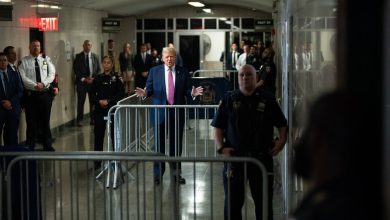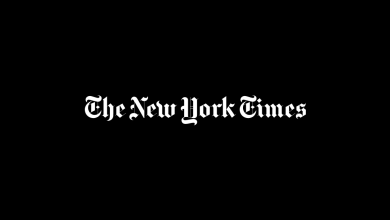Howard Schultz: Starbucks Is Battling for the ‘Hearts and Minds’ of Workers

The DealBook newsletter delves into a single topic or theme every weekend, providing reporting and analysis that offers a better understanding of an important issue in business. If you don’t already receive the daily newsletter, sign up here.
After six years in retirement, Howard Schultz returned to the top job at Starbucks in April — this time to try to repair rising employee unrest at the company as it resists a unionization effort that is sweeping the nation.
He is also back because he says the country is facing a “crisis of capitalism,” and he believes leadership is needed to “reinvent the role and responsibility of the public company,” he said at The New York Times’s DealBook D.C. policy forum on Thursday.
These excerpts have been edited and condensed for clarity.
On why he returned
I came back to reinvent the role and responsibility of a public company at a time where there is a cultural and political change with regard to the crisis of capitalism — the needs, requirements of the employee in a company today.
I don’t want to be critical but I have to be honest that the government in many ways have left people behind. If you call thousands of people who are working for a paycheck today and you asked them about economic mobility and specifically about the promise of country, for the most part they are going to say it’s not available to me. And if you ask people, unfortunately, who are Black or brown, they are going to say without question it’s not available to me for the most part.
If we think about the past, Starbucks created comprehensive health insurance for our people 25 years before the Affordable Care Act. Equity in the form of stock options for everyone, including part-time workers. Free college tuition. We can go on and on, but the truth is those benefits, as good as they are and were, are not good enough for the employee of today, primarily because Gen Z has a different view of the world. And also because the government has not provided them with a pathway that they believe they deserve.
On why he opposes unionization
Starbucks unfortunately happens to be the proxy of what is happening. We’re right in the middle of it. If a company as progressive as Starbucks, that has done so much and is at the 100th percentile in our entire industry for benefits for our people, can be threatened by a third party that means that any company in America. Now, I’ve said publicly I’m not anti-union, but the history of unions is based on the fact that companies in the ’40s, ’50s and ’60s abused their people. We’re not in a coal mining business; we’re not abusing our people.
But the sweeping issue in the country is that businesses are not doing enough, and the business is the enemy.
We don’t believe that a third party should lead our people. And so we are in a battle for the hearts and minds of our people.
Building a great enduring company is about one thing — the currency of trust.
On the state of the U.S. economy
When I look at gas prices at $6 and getting to $7 a gallon, we are on a collision course with time in terms of how long the American consumer — American family — can continue to spend at the level they are. And so, it’s hard to be optimistic unless there is a plan to get inflation under control.
On America’s relationship with China (Starbucks has 6,000 stores there)
Russia is an enemy of America, full stop. China, in my view, is a fierce competitor.
The fact that we are saber rattling back and forth between China and the U.S. in terms of our diplomacy is so unhealthy. It’s so against what the world needs.
With regard to the $360 billion of tariffs that Trump put on, it is beyond me why the president of the United States does not lift those tariffs today.
On the responsibility to speak up
Just in the last couple of months we have three ongoing, significant issues. We have gun violence and the situation in Uvalde and Buffalo. We have the upcoming situation with the Supreme Court in terms of Roe v. Wade. And we have the ongoing issue of immigration. Those three issues are on the minds of our people, and I can promise you they’re looking at Starbucks, and looking at the leaders of Starbucks, to stand up for what they believe is consistent with the values and guiding principles of our company.
It can’t be convenient. It can’t be about ringing the register.
In the world we’re living in, no company, no C.E.O., can hide. Everyone knows everything. Everything you say publicly or privately is out there. And so, let’s be sure that you’re standing up for truth.
On the mental health crisis
If you ask our people, what are the two or three biggest benefits that Starbucks provides, No. 1 is Spotify. That’s what it is. The second is Lyra Health, and that is mental health that we’re providing to our people.
We serve 100 million people at Starbucks, and there is an issue of just safety in our stores in terms of people coming in who use our stores as a public bathroom, and we have to provide a safe environment for our people and our customers. And the mental health crisis in the country is severe, acute and getting worse.
Today, we went to a Starbucks community store in Anacostia, five miles from here, which is a community that unfortunately is emblematic of communities all across the country that are disenfranchised, left behind. And here’s Starbucks building a store for the community. Now, we had a round-table discussion with the manager and other people, and we were told that from 12 to 6 p.m. today — every day — there’s no one on the street. Why? Because people are afraid that their children are going to get shot — five miles from the White House.
I think we’ve got to provide better training for our people. We have to harden our stores and provide safety for our people. I don’t know if we can keep our bathrooms open.
Starbucks is trying to solve a problem and face a problem that is the government’s responsibility.
On getting workers back to the office
I have been unsuccessful, despite everything I’ve tried to do, to get our people back to work. I’ve pleaded with them. I said I’ll get on my knees. I’ll do push-ups. Whatever you want. Come back. No, they are not coming back at the level I want them to. And, you know, we’re a very collaborative, creative group. I realize I’m an old-school person and this is a different generation. I’m in the office at 7 a.m. and I leave at 7 at night. I’m trying to make an example. I think people will come back two to three days a week and that’s the way — that’s the way it is. But the thing that I am evaluating is, what’s the level of productivity? And you know, it appears that people are working at home.
What do you think? Is Starbucks a proxy for what is happening in America? Let us know: [email protected].



